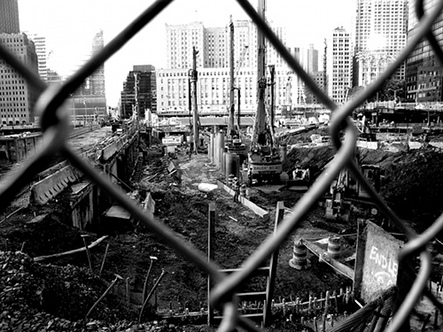We live by stories. One could even argue that we are our stories.
Our stories connect past to future; they relate our individual transient
experiences to larger themes of family, tribe, landscape, and cosmos. Those who
survive the deepest horrors do so by means of a story that gives meaning to
their lives under the horrific circumstances they must endure. Those who lose
their stories can lose the will to live. Very little damages the human soul
more than a confused, broken, or lost story of meaning.
In the United States, our national story of meaning for the beginning of the
new millennium is broken, and this confused story has traumatized the nation
more deeply than any of the events the story relates. We cannot understand what
happened — thus, we cannot plan for the future.
This is our story: on September 11, 2001, our country was attacked, and a
pair of mythic icons in the New York City skyline fell; we don't know why,
except that it was done by "terrorists" who "hate our
country" for reasons that we can't clearly articulate. We went on a
vengeance hunt for the bad guy responsible for the attack — there's a story we
all know and love. But then we stopped looking for the bad guy and instead
invaded Iraq. We don't know why, but we were told it had something to do with
keeping a madman with weapons of mass destruction (weapons that it turns out
everyone knew didn't really exist) from vaporizing the United States (which we
knew wouldn't happen), so that we could force his people at gunpoint to have
their own democratic elections. The bad guy we were originally chasing got
away, but no one cares about that any more and, of course, we don't know why.
There were no further terrorist attacks of any substance against the United
States; we don't know why. In the five years between 2001 and 2006, the US
government legalized torture of prisoners, indefinite imprisonment without
trial, warrant-less wiretaps, and a perpetual Condition Orange that means a
tube of toothpaste in my backpack on an airplane is a deadly threat to the
security of the country; all this was done in the name of protecting our
"freedoms" as American citizens…. Need I go on?
The story we've settled upon doesn't make any sense. None at all.
I have encountered a different story that I would like to share. It isn't
satisfying — it is actually quite disturbing. But it is at least coherent.
This story begins in the late 1940's, when a geologist named M. King Hubbert
started lecturing about "peak oil." He testified on the subject
before Congress in the early 1970's. Hubbert's tale is about the economics of
exploiting any non-renewable resource, be it oil, copper, or good quality
flints for spears. In broad terms, production rises and prices drop: then
production drops and prices rise. Somewhere in between, production reaches a
"peak" where availability is as high and prices are as low as they
will ever be. After the peak, prices rise until the resource becomes too
expensive to use. This arc of production is as inevitable as the trajectory of
a thrown stone. There is no question whether this peak will occur for any given
non-renewable resource. The only question is when.
Hubbert's story predicted a production peak for petroleum some time in the
twenty-first century, and as worldwide consumption rose through the last half
of the twentieth century, the predicted peak moved earlier in time. By 1990, it
was clear that the peak would occur within the first two decades of the new
century. In the absence of new sources of energy at least as cheap and
plentiful as oil, the consequences would be grim, according to this story. Our
technological civilization would turn backward as cheap energy vanished —
depending on how the peak was managed, it might collapse completely. The United
States, with its entire national infrastructure built around cheap oil, would
be especially vulnerable.
In 1990, Saddam Hussein of Iraq invaded Kuwait. He was driven out of Kuwait
during Iraq War I, and the war and subsequent economic sanctions damaged his
country so badly that it was unable to exploit its own oil fields for over a
decade. As a result, Iraq now sits atop what are expected to be the last
producing oil fields of substantial size in the whole world. Every other
untapped reserve is either small by comparison, or expensive to recover, or
both.
In early 2001, Vice President Dick Cheney convened the National Energy
Policy Development Group (NEPDG), composed of undisclosed participants; in May
of 2001, this group produced its final report. Despite numerous lawsuits under
the Freedom of Information Act, former Vice President Cheney refuses to release
the contents of the report or the identities of the participants. This report
certainly had something to say about peak oil, the dire consequences for
the US, and the existence and estimated quantity of the oil lying under Iraqi
soil.
I speculate that the report recommended that the US take control of the
Iraqi oil fields by force.
If that speculation is correct, the problem would have been how to start the
war. The world was relatively quiet in early 2001, the US economy — except for
the tech bubble collapse, which everyone seemed to view as an inexplicable
anomaly — seemed a final vindication of American Free Market Capitalism, and
the wave of the future was "globalization." To do something as
18th-century as invading another country for its resources would require — as
the Neoconservatives had been saying for at least a decade — that the United
States experience a "new Pearl Harbor," a "Day of Infamy"
that would enrage the American public, unite a fractious Congress, and grant
the President nearly unlimited authority to make war.
In September, four months after the NEPDG report was completed, the World
Trade Center towers fell, the President proclaimed war on "terror"
with nearly unanimous Congressional support (how much broader a charter could
one wish for?), and the US invaded Iraq with no exit strategy.
In 2008, we elected a new President who campaigned on a platform of getting
us out of Iraq. You might remember that he went into office with the apparent
intent to pull all the troops out of Iraq by June of 2009. After his first 100
days, that plan was scuttled, and now the entire issue has vanished from the
news and the short-term memory of the American public. The troops are still
there. The fortified bases are still there. The oil is still there.
So far this isn't a story, it is just a string of facts: Hubbert told a tale
about oil, Iraq didn't develop the oil the geologists believe is there, Cheney
convened a secret energy conference, the Twin Towers fell, the US invaded Iraq,
Obama reneged on his promise to get us out of Iraq.
Let me turn these facts into a story.
In early 2001, President George W. Bush and Vice-President Richard Cheney,
both oilmen hailing from families deeply involved in oil for decades, decided
to act on the conviction that the Hubbert Peak was real, imminent, and spelled
a terrible doom for the United States. Many others in the US government
believed this, perhaps ever since the 1970's when Hubbert first told his story
to Congress. Oil companies certainly believed it, and were planning their
business strategy around it. Cheney initiated the NEPDG, which recommended that
the US take control of the oil fields in Iraq as a national strategic
imperative — partly to buy breathing room for the US as global oil prices
rose, but also to prevent the Iraqi oil, presumptively the last cheap oil in
the world, from falling under the control of nations hostile to the US. The
war-planning necessarily included the attack on the World Trade Center; some
such public incident was needed to provide the political impetus for war. On
September 11, the WTC attack occurred (as planned), the President was given a
blank check to pursue "terrorists" anywhere he wished (as planned),
and in March of 2003 the US invaded Iraq to establish control over Iraqi oil.
Mission Accomplished.
I won't say this story is true. I don't know if it's true. What I do know is
that it makes a whole lot more sense than the muddled "terrorist"
story commonly accepted regarding the Twin Towers.
This story explains why Vice President Cheney classified the NEPDG report
Top Secret, and still refuses to release it.
This story explains why the US almost immediately abandoned the hunt for
Osama bin Laden in Afghanistan.
This story explains why we invaded and occupied Iraq.
This story explains why 9/11 was not the first in a wave of attacks against
the United States, but continues to stand as an isolated incident.
This story explains the haunted look on Bush's face in one of his last
interviews in office, when he said, "Don't let it fail. Don't let Iraq
fail."
This story explains what former Bush administration officials meant when
they admitted without elaboration that the Iraq war was about oil.
This story explains why Obama reneged on Iraq once he took office, and why
the next president (be it Palin, Putin, or Joe the Plumber), will keep us in
Iraq as well, regardless of what he or she promises the public.
This story may even explain the attempt from 2001 through 2006 to turn the
US into a surveillance state with a drastically weakened Bill of Rights. It was
never about "terrorists" — it was about an unruly American public
facing an end to their way of life in the coming years. Cheney, in particular,
never hesitated to express his belief that democracy was too weak to stand in
the modern world — by which I believe he meant a world without cheap oil. That
also explains why the exiting Cheney warned the incoming Obama that the new
president would thank him in the years to come for all of the power he and Bush
had concentrated in the executive branch.
Most importantly, this story explains how planning, executing, and covering
up the WTC attack could be viewed an act of American patriotism. This is
of critical importance.
There has been discussion on this site and others regarding how the standard
explanation of the WTC collapse doesn't add up. I've been interested in this
subject since late September of 2001, to the extent that I built my own
(inconclusive) conservation-of-momentum models for the then-popular
"pancake theory" of collapse. Personally, I think controlled
demolition of the towers is the simplest, most parsimonious physical
explanation; that's what the collapse looks like in video clips, and it easily
matches the kinetic energy, momentum, pulverization, seismic, and thermal
profiles of the collapse and the aftermath. It explains the presence of
unburned explosives in the ash that settled over NYC. No one has ever said that
demolition was physically impossible.
But there's a major problem with the demolition argument. As a human story,
it is not credible. You cannot go far down the demolition road without
realizing that the US government had to be involved in at least a massive cover-up
after the fact, and likely the planning and execution of the attack as well.
This is an obvious and unavoidable sticking point. It is why President Bush
ordered the director of the National Institute of Standards and Technology
(NIST) 9/11 study to not waste time on "crackpot" theories of
controlled demolition of the towers. It is why the 9/11 dissidents are viewed
as "conspiracy nuts."
Both 9/11 and the Iraq War involved casts of thousands: top tactical and
strategic levels of all branches of the military, the CIA, the NSA, the FBI,
FEMA, members of Congress, the governor of New York, the mayor of New York
City, the NYC police and fire departments, the engineers who performed on-site
investigation of the WTC ruins, the salvage companies who carted the rubble
away. Only a very few would have known everything, of course, but a lot of
these people are very bright and they have a lot of information at their
fingertips: many of them are, after all, the people who advise the President.
If it's so obvious to us out here that there was a government involvement and
cover-up, then these people would have known. Yet they played along and
still haven't come out to the public. Why?
I can think of only two possible kinds of motivation that would sustain a
conspiracy on this scale. One is religious fervor, which would not seem to
apply here. The other is patriotism.
We can point to any number of large-scale conspiracies committed out of a
sense of patriotism. The Manhattan Project comes immediately to mind. Operation
Valkyrie in Hitler's Germany. The entire Cold War, on both sides. Such major
conspiracies based on a sense of patriotism do exist, and the players usually
take their secrets to their graves. Most of them sleep well at night, secure in
the belief they are serving the greater good.
If you want to make a credible argument for US government involvement in
9/11, you need a patriotic reason: a simple and extremely powerful patriotic
reason, easily communicated, easily understood. An argument something like,
"If we don't do this, tens of millions of Americans will die and the
United States government will collapse. There will be nothing left of our
nation, our people, our way of life. The American ideals will be gone forever.
Doing this is worth the loss of 10,000 American lives. They are making a
heroic sacrifice for the survival of the nation. And you are doing your duty
for your country."
That, or something very much like it, has to be the argument, and it must be
believed.
This is, of course, exactly what the worst-case Peak Oil scenario promises
us. Unlike global warming, there is no controversy about Peak Oil itself, only
a question of when it will occur and how harshly the economic consequences will
play out. Most projections I've seen range from grim to catastrophic,
especially for the United States.
I'd like to make it clear that I don't agree with this argument at all.
Destroying the Twin Towers while people were still in them was an atrocity.
Using terror to manipulate the public and Congress for five years was an
atrocity. Committing atrocities is not patriotic. I also don't agree with the
worst-case Peak Oil scenarios. We may have inertial-confinement fusion within
the next year or two, something I didn't expect to see in my lifetime.
Scientists are learning how chlorophyll uses quantum interference to approach
ninety-percent efficiency in conversion of solar energy. As oil prices rise,
all kinds of strange technology will come out of the woodwork. I don't think
Peak Oil will play out anything like what experts predict, other than the
general prediction that we won't be burning oil in another century. That much
seems certain: it does not require a diminished society, however.
But none of this is about what I believe. It is about what Bush, Cheney,
Rumsfeld and Wolfowitz believed in 2001. It is about what their advisers
believed. It is about the real national story that guided the actions of
the United States from 2001 through the present.
I don't know the real story. I do know that the muddled mess about terrorists
and toothpaste is not the real story.
I invite any of you who have better stories to share them.
Notes:
[1] I considered plastering this with references, but instead I've decided
to reference a single book, which is clear, concise, and not too alarmist in
its tone. See Confronting Collapse, by Michael C. Ruppert, ISBN
978-1-60358-264-3.
If you like this piece, please support the Evolver Social Movement so we can bring you more like it.
Image by Chor Ip, courtesy of Creative Commons license.














